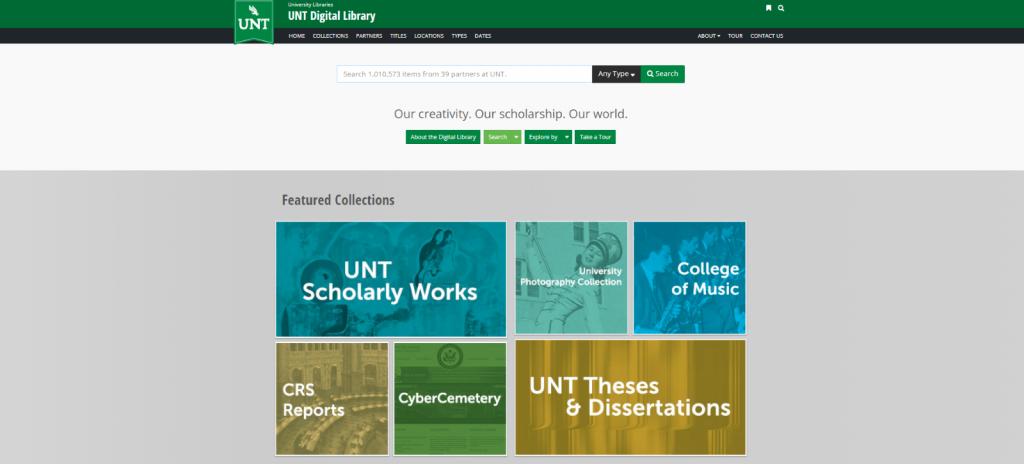Written by: Devika Jagarlamudi

The library of today looks quite different than the libraries of old, as technology has woven its way into the deepest stacks and archives. With books turning digital and card catalogs stored in the cloud, the role of the librarians has radically transformed as well. To get an inside look at this digital revolution, I had the chance to interview Marcia Mcintosh, Digital Production Librarian at UNT. Our lively chat revealed just how much libraries have evolved to remain vibrant hubs of connection and learning in the internet age.
If you’re curious what digital librarians like Marcia work on, one of the flagship projects at UNT is The Portal to Texas History. This expansive online portal gives researchers access to a treasure trove of digitized newspapers, photos, documents, and other primary sources related to Texas history and culture. Marcia and her team play a crucial role in building and maintaining the portal, helping bring unique local history to the public’s fingertips. Whether you want to geek out over cutting-edge metadata systems or simply peer into the high-tech world of 21st century librarianship, I hope you’ll join me on this journey of discovery through the lens of one digitally minded librarian.
Here are the questions I have asked Marcia to get to know more about digital libraries.
What are some of the most unique or valuable resources in the university’s digital library collection?
There are so many! I can speak to a few I enjoy.
- Texas Centennial Scrapbook by Doris Rae Levy from the Fort Worth Jewish Archives. She was 10 years old and made it for a contest before passing away. The scrapbook won a flag in the contest.
- The Guinness World Record Attempt by Andrew Torget. I’m not from Texas, so this is nice to have this as a Texas History resource.
- The T.B. Willis Collection. He always sends in fun photos and items.
- Also, any of our Rescuing Texas History Collection. I find it entertaining.
How does the library acquire and manage its digital resources?
In the Digital Projects Lab, we digitize materials from almost 500 partners throughout Texas. We also work with departments on campus and in the libraries. We digitize their analog collections or upload digital items and return the physical materials to the partners with digital copies.
Are there any challenges associated with digital collections?
Yes, we want to capture the item so that its digital representation is authentic to the original, analog version. Sometimes the equipment, the software, or the item itself does not wish to participate. Also, we divide materials down to the item level which can take a lot of time. For example, if you go into an archive you can call up and browse through whole boxes of material that was described with one paragraph in a finding aid. We invest the time to record information for every item in one of those boxes. The scale can be a bit daunting.
How can students and faculty make the most of the digital resources when doing research?
I imagine:
- Keep yourself abreast of the offerings from your library through newsletters or relationships with subject librarians.
- Take time to explore the different collections.
- Refine your search habits.
- And be patient.
It can be like panning for gold, you never know what you might find.
How has the shift from print to digital resources impacted the library and its users over the years?
I can speak for myself as a library user. I was accustomed to going to the library for print first when checking out books or movies, but have now moved to e-version first, with print being my backup plan. I suppose it is a mindset shift as well as an indication of the increased number of electronic resources libraries provide users.
What future trends or changes do you foresee in terms of digital libraries?
- Refined handwriting search capability.
- The holy grail of auto-crop.
- More automation.
- More time to see more materials online.
Where do you see the future of digital libraries headed in the next 5-10 years? What potential changes or innovations excite you?
In our lab we’ve moved from slower — but still much loved– scanning systems to camera-based systems with one-shot capture. I expect to witness and be incredibly grateful for further developments that makes our jobs more efficient.
Is there anything else you would like to share?
Thanks for taking the time to hear about Digital Librarianship.
After my enlightening discussion with Marcia, it’s clear that digital librarians are driving progress while preserving libraries’ core values. I now see libraries in a whole new light. I’m so grateful to Marcia for taking the time to share her experiences as a digital librarian. I’m excited to see how libraries continue to adapt in our increasingly high-tech world. I hope you’ve enjoyed this glimpse into the future of libraries as much as I have.
If you have any additional questions, contact AskUs at AskUs@unt.edu or contact the Digital Library through their contact us form.
References:
The portal to Texas history. (2023). https://texashistory.unt.edu/



Venkata Gnaneswari Regati
Nice work!
Lakshmi Prasanna Kumar Rayala
Bringing out your university’s library enlightenment through your writing. Nice work and All the best for future endeavors.